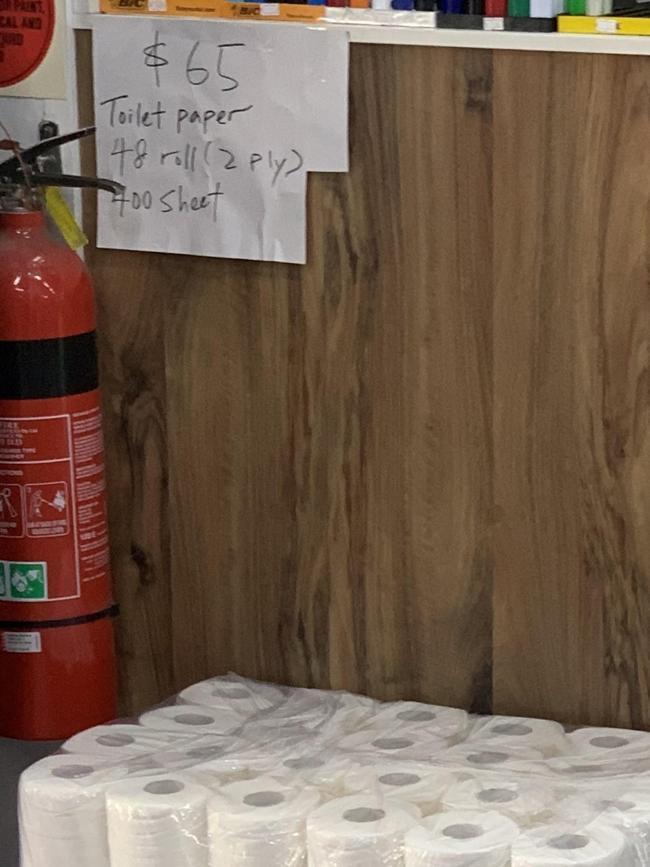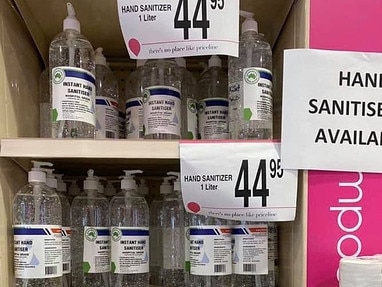Retailers gouging customers during COVID-19 ‘named and shamed’
From selling a 1L bottle of hand sanitiser for $200 to charging $652 for 48 rolls of toilet paper, businesses using COVID-19 stock restrictions to unfairly hike their prices will be put on a new name and shame register. SEE THE LIST OF OFFENDERS
NSW Coronavirus News
Don't miss out on the headlines from NSW Coronavirus News. Followed categories will be added to My News.
Businesses using COVID-19 conditions to unfairly hike their prices will be put on a new name and shame register.
NSW has become the first state in the country to act on ruthless price gouging by small and large operators.
From today businesses will need to provide NSW Fair Trading with a reasonable excuse as to why they are charging inflated prices for key products. Some of the worst examples include $200 for a 1L bottle of hand sanitiser, $652 for 48 rolls of toilet paper, $999 for a thermometer that normally costs $114 and $500 for six boxes of tissues.


Reports made to NSW Fair Trading will be investigated – functioning like a “warning system” for business – and traders will be asked to justify any significant price increases on essential items.
MORE FROM BEN PIKE
Meet the Concrete Kings of Sydney
Renters charged a ‘pet licence fee’
“This ensures businesses have the right to respond to claims made against them, rather than face trial by social media, especially if there is a legitimate reason for the
price increase,” NSW Better Regulation Minister Kevin Anderson said.


If there is no known legitimate business reason for the increased price, a public warning can be issued by the minister about the conduct of the business.
Legitimate excuses include increased transportation costs, increased staff
costs, shortage of a particular good due to extenuating circumstances such as drought
or price increases from the manufacturer or supplier.
“Issuing these warnings will help consumers make informed decisions about where to
shop and will deter traders who may consider engaging in this conduct,” Mr Anderson
said.
“This is a time to look after each other and ensure people can access the goods and
services they need to stay safe and healthy.”
Consumer group Choice said they have received hundreds of complaints in the past month in relation to gym equipment, fridges, freezers, fuel and small grocery items.
While they say a lot of price gouging is happening on Facebook marketplace and eBay, they singled out women’s online retailer Millers, which is charging $60 for three packets of alcohol wipes (180 wipes in total).
They have also been accused of "panic marketing" or advertising encouraging people to stockpile essentials.
Choice has also received numerous complaints about online whitegoods retailer Kogan.
“These reforms mean NSW is the first state to take on the problem of price gouging and unfair pricing during an emergency,” Choice director of campaigns Erin Turner said.

“They are a great first step I need to be backed up with legislation that will stop some of the really bad ones that won’t care about being named and shamed.
“In some parts of the United States, for example, if the government declares an emergency then immediately prices on essential items are capped.”
Business NSW CEO Stephen Cartwright said the reforms are a “sensible middle ground”.
“Businesses are, in the vast majority of cases, doing the right thing in the face of a dramatic increase in costs for things such as freight, and trial by social media can place ever lasting damage on a brand or local shop that they have no hope of recovering from, despite the facts,” Mr Cartwright said.
“A warning system gives the business the opportunity to explain their costs in these unprecedented times, while ensuring the public has a rightful avenue to raise legitimate concerns.”
